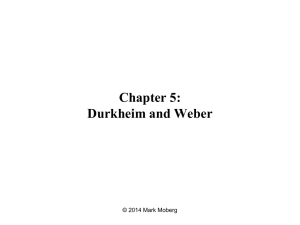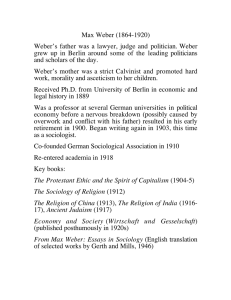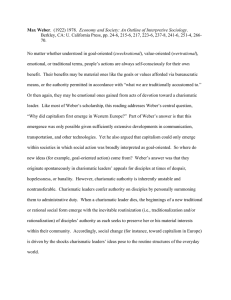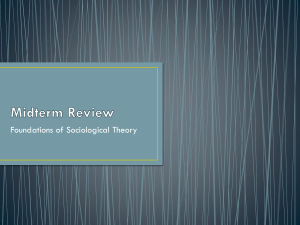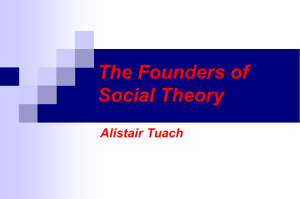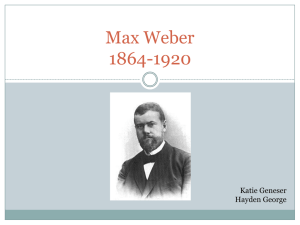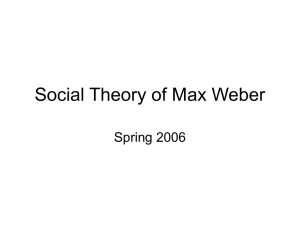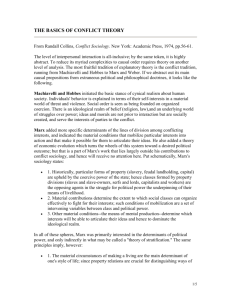Midterm Review (Outline Format) Foundations of Sociological
advertisement
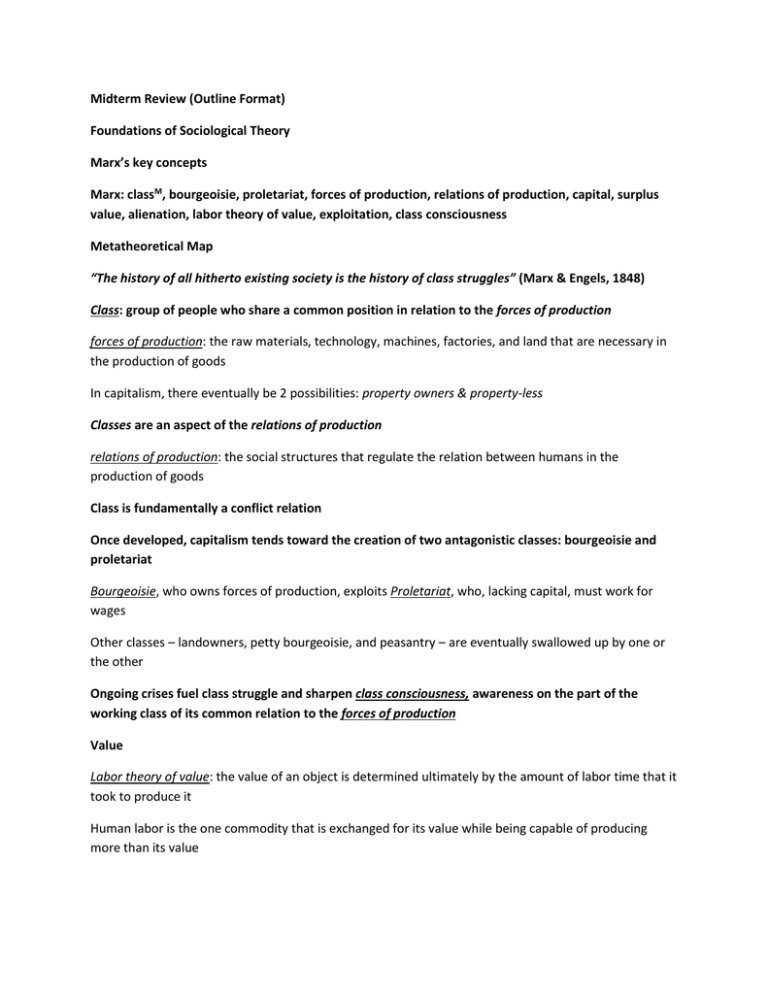
Midterm Review (Outline Format) Foundations of Sociological Theory Marx’s key concepts Marx: classM, bourgeoisie, proletariat, forces of production, relations of production, capital, surplus value, alienation, labor theory of value, exploitation, class consciousness Metatheoretical Map “The history of all hitherto existing society is the history of class struggles” (Marx & Engels, 1848) Class: group of people who share a common position in relation to the forces of production forces of production: the raw materials, technology, machines, factories, and land that are necessary in the production of goods In capitalism, there eventually be 2 possibilities: property owners & property-less Classes are an aspect of the relations of production relations of production: the social structures that regulate the relation between humans in the production of goods Class is fundamentally a conflict relation Once developed, capitalism tends toward the creation of two antagonistic classes: bourgeoisie and proletariat Bourgeoisie, who owns forces of production, exploits Proletariat, who, lacking capital, must work for wages Other classes – landowners, petty bourgeoisie, and peasantry – are eventually swallowed up by one or the other Ongoing crises fuel class struggle and sharpen class consciousness, awareness on the part of the working class of its common relation to the forces of production Value Labor theory of value: the value of an object is determined ultimately by the amount of labor time that it took to produce it Human labor is the one commodity that is exchanged for its value while being capable of producing more than its value Surplus value: the difference between what workers earn for their labor and the price or value of the goods that they produce Surplus value is the source of the capitalist’s profit Also the source of worker’s exploitation because the worker gives more than is given in return, without having any voice in this relationship of exchange Four aspects of alienation In capitalism, workers become alienated or estranged from: 1) product of labor Product becomes “an alien object exercising power over him" 1) labor process, the act of production 2) species being, or own human essence Estranged labor turns “man's species being, both nature and his spiritual species property, into a being alien to him, into a means to his individual existence. It estranges man's own body from him, as it does external nature and his spiritual essence, his human being.” 1) other people “An immediate consequence of the fact that man is estranged from the product of his labor, from his life-activity, from his species being is the estrangement of man from man.” Durkheim’s key concepts anomie, social facts, social solidarity, mechanical solidarity, organic solidarity, collective conscience, ritual, symbol, sacred and profane, collective representations Sociology is “the study of social facts” (Durkheim, 1895) social facts: conditions and circumstances external to the individual that, nevertheless, determine the individual’s course of action “A social fact is every way of acting, fixed or not, capable of exercising on the individual and external constraint; or again, every way of acting which is general throughout a given society, while at the same time existing in its own right, independent of individual manifestations…” (117) social solidarity: the cohesion of social groups There are two types of positive solidarity: mechanical & organic mechanical solidarity links the individual to society without any intermediary Society is organized collectively and is composed of beliefs common to all members of the group The individual consciousness depends on the collective consciousness organic solidarity refers to a type of solidarity in which each person is interdependent with others, forming a complex web of cooperative association Two key conditions that are “chronic” in modern industrial society egoisim: a lack of integration of the individual into the social group anomie: a lack of moral regulation moral regulation consists in rules or norms, that set limits to what are otherwise limitless and destructive desires “the malady of infinite aspiration” (Lukes quoting Durkheim, Thinking Allowed) These conditions, in the extreme, pathological form are expressed as: egoistic suicide anomic suicide Durkheim’s definition of religion Religion: a unified system of beliefs and practices relative to sacred things, that is to say, things set apart and forbidden - beliefs and practices which unite into one single moral community called a church, all those who adhere to them. Communal function of religion is carried out through ritualization and symbolization Ritual: highly routinized communal practices that bind individuals to community Moments when the moral authority of group is perceived as a spiritual force Symbol: something that stands for something else, a representation that calls up collective ideas and meanings Collective representations: symbolic or figurative representations of the collective, the social group “Collective sentiments can become conscious of themselves only by fixing themselves upon external objects,” mixing themselves with the life of the material world Weber Verstehen, ideal types, Protestant ethic, calling, iron cage, rationalization, bureaucracy, authority, charisma, classW, status, party No one knows who will live in this cage in the future, or whether at the end of this tremendous development entirely new prophets will arise, or there will be a great rebirth of old ideas and ideals; or if neither, mechanized petrification embellished with a sort of convulsive self-importance. For of the last stage of this cultural development it might well be truly said: “Specialists without spirit, sensualists without heart; this nullity imagines that it has attained a level of civilization never before achieved. Rationalization rationalization: the process whereby an increasing number of social actions and social relationships become based on considerations of efficiency or calculation Values, traditions and emotions displaced by formal and impersonal bureaucratic procedures disenchantment Verstehen: interpretive understanding Weber defined sociology as a “science which attempts the interpretive understanding of social action in order thereby to arrive at a causal explanation of its course and effect” Unlike Marx and Durkheim, who sought to uncover universal laws applicable to all societies, Weber attends to the production of meaningful behavior as it is grounded within a specific historical context seeks to understand the culturally-patterned states of mind or motivations that guide individuals’ behavior Ideal type The ideal type is analytical construct, a means to do social research A tool that aids description and explanation Ideal type is derived from empirical observation, but it’s an abstraction A combination of elements which, although found in reality, are rarely found in this specific form It's not "ideal" in the normative sense, but in the sense that this combination of elements is not found in reality in this pure form e.g., an ideal type of murderer Ideal types of social action 1) traditional: actions controlled by tradition or deeply rooted habits, "the way it's always been done" 2) affective: actions determined by the actor's specific affections and emotional state 3) value-rational: actions that are determined by a conscious belief in the inherent – ethical, esthetic, religious, etc. – value of a type of behavior, regardless of its effects 4) instrumental-rational: actions that are carried out to achieve a certain goal; the actor calculates which actions will lead in the best and most effective manner to the goal that's been set class situation by market situation Class is economically determined but it refers not simply to relations to the means of production (owners of capital vs owners of labor power a la Marx) Class refers more broadly to market situation Weber subdivides property owners based on the kind of property that is usable for returns: rentiers and entrepreneurs Weber subdivides those who lack property on the basis of the kinds of services offered and they way in which they make use of these services: unskilled workers, skilled laborers, professionals, etc. Class refers to "similarity of life chances" as determined by "economic interests in the possession of goods and opportunities for income" under the conditions of the commodity or labor markets Status Status situation is determined by social estimation of honor, which may be connected with any quality shared by a plurality and, of course, it can be connected to a class situation In contrast to classes status groups are usually “groups” but are often amorphous Class distinctions are linked in varied ways with status distinctions Status is stratification according to principles of consumption of goods and services, i.e., "lifestyle" Domination/Authority Domination/authority: the probability that certain specific commands (or all commands) will be obeyed by a given group of persons 1) Implies voluntary compliance, or an interest in obedience 2) Requires a staff, or a special group that can normally be trusted to execute the general policy as well as the specific commands 3) Obedience can result from the following motives: Custom Affective ties Material interests – purely material interests, however, result in a relatively unstable situation Ideal Belief in legitimacy Ideal types of legitimate authority Authority is defined by claim to legitimacy Weber specified three types: Rational-legal authority rests on a belief in the legality of enacted rules Traditional authority rests on the established belief in the sanctity of immemorial traditions Charismatic authority rests on the devotion to the exceptional sanctity, heroism or exemplary character of an individual person Charismatic authority Charismatic authority depends on relationship between leader & followers I. Recognition of charisma by subjects II. Leadership must somehow benefit followers III. Charismatic community forms and is animated by charismatic qualities of leader & followers IV. Charisma constitutes a “call,” “mission,” or “spiritual duty” despises traditional or rational everyday economizing or seeking regular income thru continuous economic activity I. Charisma has revolutionary force, it’s often transformative Routinization of charisma By definition charismatic authority is exceptional, not an everyday thing Charisma either fades away or becomes routinized It cannot remain stable but must become traditionalized or rationalized or both Motives behind the transformation: Ideal and material interests of followers in the continuation of the community Still stronger ideal and stronger material interests of staff, disciples, and party workers continuing relationship Bureaucracy Bureaucracy is the dominant form of social organization in modern society due to its technical superiority By design, bureaucratic organizations—and the rational procedures that govern them—routinize and standardize people and products Operating “[w]ithout regard for persons…bureaucracy develops the more perfectly, the more it is ‘dehumanized,’ the more completely it succeeds in eliminating from official business love, hatred, and all purely personal, irrational, and emotional elements which escape calculation.” (Intro, 211) Characteristics of Modern Bureaucracy I. Official jurisdictional areas II. Official hierarchy and appeals process III. Management based on written records – files or accounts IV. Management requires training in a specialized field V. Office demands “full working capacity” of official VI. Management follows general rules, the knowledge of which represents technical expertise – jurisprudence, administrative or business management Protestant Ethic motivated the rise of early modern capitalism with appeals to religious duty Weber insists that “modern capitalism” is different than "economic traditionalism" “A man does not ‘by nature’ wish to earn more and more money, but simply to live as he is accustomed to live, and to earn as much as is necessary for that purpose. " (173) Protestant Ethic, linking worldly pursuits to a spiritual mission, promoted this break from custom and helped reorient economic behavior Protestant ethic Weber noted that there's something peculiar about this "philosophy of avarice": the duty of an individual toward the increase of his capital, which is considered "an end in itself" What is preached is not simply a "means of making one's way in the world, but a peculiar ethic“ a duty, an ethos Aim is to earn more and more money while avoiding all enjoyment of life Economic acquisition becomes an end in itself (in this world) Protestant Ethic as asceticism One of fundamental elements of the spirit of modern capitalism, and modern culture in general is the spirit of Christian asceticism Weber calls this kind of austerity and renunciation the essence of middle class life Weber believes Ben Franklin’s popular writings on saving & thrift capture this "spirit of capitalism" in almost "classical purity," and thus could be likened to an ideal type Faith replaced by an iron cage of rationality Over time capitalism loses the ethical driving force that spurred its initial rise "The Puritan wanted to work in a calling; we are forced to do so" "Fate decreed that the cloak should become an iron cage" i.e., the cloak of rationality, which earlier ascetics wore voluntarily He characterizes "the last stage of this cultural development" thus: "Specialists without spirit, sensualists without heart; this nullity imagines that it has attained a level of civilization never before achieved." Metatheoretical Map
